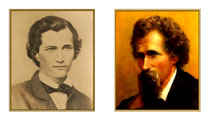|
Henry KendallKendall was named in honour of the poet, Henry Kendall (1839 – 1882). Henry Kendall came to Camden Haven, as the village of Kendall was then called, in 1876 to work for his friend, Michael Fagan, whose timber mill stood on the site of today’s Kendall Services & Citizens Club. He loved the forest and riverine landscape and the five years he spent here with his wife, Charlotte, were happy ones. He wrote of the district:
Henry Kendall was born at Ulladulla in 1839, the son of Basil and Matilda Kendall and grandson of the missionary the Reverend Thomas Kendall who spent many years working in New Zealand. Henry’s childhood was not happy. His father, a some-time seaman and wanderer who spent some years in Chile, was always unsettled and died early of tuberculosis. His mother became a heavy drinker. At the age of seventeen, he went to sea for a short time but soon found that life did not appeal to him. He was encouraged into a literary career by the Grafton solicitor for whom he worked from time to time and began sending verses to newspapers and journals. They were published under the name Mr. H. Kendall, N.A.P. [Native Australian Poet]. He spent five years working as a public servant in Sydney and, by 1867, had become confident enough to deliver a series of lectures at the Sydney School of Arts. One of these, on “Love, Courtship and Marriage”, precipitated him into experience of all three. He walked home after the lecture with Miss Charlotte Rutter, daughter of a former Government medical officer, they fell in love, and, after a brief courtship, were married the following year. They moved to Melbourne where Henry attempted, unsuccessfully, to support his family with his earnings from journalism. Their first daughter Araluen was born there but their abject poverty contributed to her death from a dental fever aggravated by malnutrition. Araluen Street, Kendall, commemorates her. Henry and Charlotte returned sadly to Sydney where, despite the birth of two sons, he suffered a mental breakdown. Charlotte left him and he spent some time in the Gladesville Asylum. In 1873 Kendall was invited to stay with the Fagan brothers, timber merchants near Gosford, and in 1876 he moved to the Camden Haven (now Kendall). Charlotte returned to him with the children and they added a son and two daughters to the family. Altogether they had seven children although not all survived. While here he composed topical and political skits for the press and, in 1879, wrote the words for the cantata to be sung at the Sydney International Exhibition. He also won 100 guineas for an occasional poem in celebration of the same event. His third volume of verse, Songs from the Mountains, published in 1880, was his first financial success, selling a record number of copies in the first two months. Kendall enjoyed the admiration and patronage of Sir Henry Parkes, Premier of New South Wales. In 1881, Parkes appointed him as the first Inspector of Forests for NSW at the, then, enormous salary of £500 per annum. In 1881 the family moved to Cundletown but the arduous inspection tours on horseback in all weathers proved too much for him. His health failed and he died in Charlotte’s arms at the Fagans’ Redfern home on 1 August 1882. He was buried at Waverley Cemetery, overlooking the sea. While in Camden Haven, Henry Kendall wrote to the Post-Master General lending support to the villagers’ request for a post office and, when it was later established, the name of the village was changed, posthumously, to Kendall in his honour on 1 October 1891. Kendall is proud of its name and its association with Henry Kendall. He is a dearly loved presence in the district. The sesquicentenary of his birth was commemorated by the inaugural conference of the University of New England’s Centre for Language and Literature Studies, held in Kendall in 1990. The papers of that conference are collected under the title Henry Kendall, The Muse of Australia. He is honoured by a small park of contemplation at the corner of Comboyne and Graham Streets and celebrated annually by the Henry Kendall Oration given at a luncheon at the Kendall Services and Citizens Club. Henry Kendall’s beautiful descriptive poem Bell Birds is perhaps his best known. Many Australian children learnt it at school. Bell-Birds The silver-voiced
bell-birds, the darlings of day-time, October, the maiden
of bright yellow tresses, Welcome as waters
unkissed by the summers Often I sit, looking
back to a childhood Henry Kendall Acknowledgements: © Elaine van Kempen 2006 |
© Kendall Community Centre May 2006

